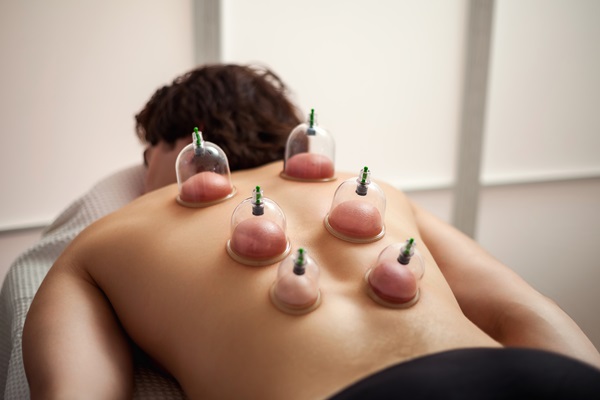How Cupping Therapy Can Help With Pain Management

Cupping therapy is an ancient healing practice rooted in traditional Chinese, Egyptian, and Middle Eastern medicine. It involves placing cups on the skin to create suction, which increases blood flow, reduces inflammation, and facilitates healing. This technique can be used in physical therapy as a complementary treatment in your pain management plan.
Understanding cupping therapy
Cupping therapy, also known as myofascial decompression, involves using glass, bamboo, silicone, or plastic cups placed on the skin to create a vacuum. This suction pulls the skin and underlying tissues into the cup, increasing blood circulation to the affected area. There are different methods of cupping, including dry and wet cupping.
Dry cupping
The physical therapist places cups on the patient's skin using their hands, a pump, or a flame for 5 to 10 minutes. It may be combined with a massage session, known as massage cupping or running cupping.
Wet cupping
In this method, a small incision is made in the skin before the cups are applied to draw out a small amount of blood. The physical therapist may leave the cups in place for 10-15 minutes.
How cupping therapy works
Increasing blood circulation is one of the primary mechanisms of cupping therapy for pain management. When the skin is drawn into the cup, it stimulates blood flow to the area, which can help reduce muscle tension and promote healing. Increased circulation can also help remove toxins and waste products from the body, further alleviating the patient's pain.
Additionally, cupping therapy can help activate the immune system, reducing inflammation and enhancing the body's natural healing processes. It can also stimulate the nervous system, releasing endorphins, the body's natural painkillers.
Benefits of cupping therapy for pain management
Relieves muscle pain and tension
Cupping therapy is particularly effective for treating muscle pain and tension. The increased blood flow to the muscles can help relax them, reduce stiffness, and alleviate pain. This is particularly beneficial for conditions such as chronic back, neck, or shoulder pain.
Reduces inflammation
Cupping therapy helps the body reduce inflammation. The vacuum-like suction from the cups creates micro-trauma in the applied areas. This allows the patient's body to release various chemicals, fibroblasts, and white blood cells to the affected area, stimulating the healing process.
Increases blood flow
Cupping helps increase blood circulation near the area where the physical therapist places the cups. This helps soothe muscle tension, which improves overall blood flow and boosts cell repair. It can also help build new connective tissues and produce new blood vessels.
What to expect during a cupping therapy session
During a cupping therapy session, the physical therapist will place the cups on specific areas of the body, depending on the location of the pain and the method used. The most common areas include:
- Back
- Chest
- Stomach
- Buttocks
Like any medical procedure, there are potential risks and side effects. Some patients may experience mild discomfort, burns, or bruising when the cups are applied. However, these side effects are usually temporary and fade in about 1-10 days.
Learn more about our pain management services
Cupping therapy offers a natural and holistic approach to pain management. Orange County Physical Therapy OCPT offers cupping therapy and other pain management treatments in the Newport Beach area. Call our office to learn more about our services or to schedule a consultation.
Request an appointment here: https://ocptclinic.com or call Orange County Physical Therapy OCPT at (949) 299-0297 for an appointment in our Newport Beach office.
Check out what others are saying about our services on Yelp: Cupping Therapy in Newport Beach, CA.
Related Posts
Sports physical therapy helps athletes return to play safely after injuries or setbacks. With the help of a physical therapist, treatment strives to improve mobility and performance while alleviating pain. These providers also look closely at how the body moves, not just where it hurts. With the right timing and a clear plan, this type…
Manual therapy is an advanced form of physical therapy techniques that focuses on hands-on techniques to address musculoskeletal pain, stiffness, and limited mobility. This approach differs from treatments that primarily rely on pain medications or surgical procedures. Manual therapy focuses on working directly with your physical therapist to help you regain function and mobility in…
Effective pain management from a physical therapist does more than mask symptoms. It reduces inflammation, restores movement, and builds resilience. Many may wonder where to start and which steps truly matter. With guidance from a licensed physical therapist, a clear plan can calm flare-ups and prevent them from returning. Here are a few ideas that…
Massage therapy is widely known for its therapeutic benefits, particularly when administered by an experienced physical therapist. Physical therapists have a unique understanding of musculoskeletal anatomy and movement and can utilize massage therapy to help patients recover. This approach, also known as physical therapy massage, reduces pain and improves overall physical health.According to the National…
